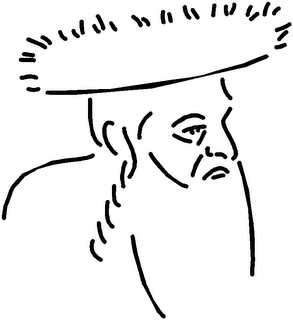 Continued from here:
Continued from here:Sea monsters! Yes, turns out the answer to life, the universe, and everything is... sea monsters. I realize you might wonder how that answers anything, and I would too; but I've been enlightened now.
"I have pictures!" he exclaimed breathlessly, after his mad rush to catch up to me before I leave the place and leave his sensational discovery painfully bottled up inside him like a hermit who won the Mega Millions.
"What pictures?" I ask reflexively, before having time to think if I really want to know, which I didn't.
Taking his cue, he launches into a long monologue that somehow culminates in the grand finale of an incredible answer to all his questions, finally proving his longstanding faith in our mesorah, our sages, and by extension, our God. It goes something like this:
His difficulties all started with the realization that the physical world doesn't really work the way our sages portray it. Once that realization hits -- and when it does, it hits hard -- you start to feel unsure in the logic, metaphysics, philosophy, and theology of our sages as well. After all, if they're wrong in one field of human knowledge, they might be wrong in the others as well. At least it bears investigating. And the result of those investigations is what is feared the most. It is almost an instinctive dread -- a reluctance to take that first step down the slope at the bottom of which we have been taught lies unimaginable horror and debasement.
Now he has nipped the original problem in the bud. Our sages aren't mistaken in the ways of the world; it is we who are simply ignorant and yet to discover how right they really were! And he has the exhibit to prove it.
 As is well known, Rashi, the brilliant and highly regarded medieval commentator, claims the existence of man-mating mermaids (what fun!); he even identifies them as siren, the name derived from Greek mythology. What do we do with an obviously mythical creature taken for genuine in our mesoreh? Why, we claim it is genuine!
As is well known, Rashi, the brilliant and highly regarded medieval commentator, claims the existence of man-mating mermaids (what fun!); he even identifies them as siren, the name derived from Greek mythology. What do we do with an obviously mythical creature taken for genuine in our mesoreh? Why, we claim it is genuine!"The Asian tsunami uncovered amazing creatures," he tells me. "They prove our sages right!"
I know immediately that he is referring to these pictures.
 These hoaxes have been making the rounds for a long time. But he is convinced.
These hoaxes have been making the rounds for a long time. But he is convinced."Look what the scientists didn't know, but our holy sages did!" he exclaims with great fervor and conviction. His eyes glow with an almost sacred zeal. It suddenly dawns on me that he has invested great emotional capital in persuading me of the correctness of his view. He is hoping to use my change of heart to help dissipate his own troubling and ever-increasing doubts.
"If we didn't know about this, what else don't we know?" he continues excitedly. "We may yet be wrong -- and our sages right -- in medicine, cosmology, physics, zoology......" his voice trails off. I don't know if it is because he suddenly realizes the absurdity of carrying the argument this far, or because he considers his arguments self evident and obviously correct by now. Whatever the case, he finishes with an expectant smile and semi-triumphant but obviously worried demeanor, waiting for my reaction.
I make a split-second decision. Do I laugh at him and tell him he's crazy? Do I send him to the snopes article so he can see the hoax for himself? Do I launch into a philosophical and sociological discussion on the nature of myths in our history and culture?
"You're absolutely right," I say with the most earnest expression I can muster. "Perhaps we are really wrong, and our sages and mesorah always right."
He looks at me quizzically. "What?"
"Yes," I repeat. "We may be full of hubris. Who are we to argue with the greats that came before us? Science might yet change tomorrow after another tsunami, but our knowledge is everlasting."
The smile on his face gets wider -- very wide indeed. He is pleasantly surprised by the easy victory over his inner and outer nemesis. "Right!" he sighs with relief. "Exactly right!"
And thus I put him out of his misery. Back to the old childish and comforting beliefs of his cult; no longer tortured by doubts. (At least until he realizes the foolishness of all this himself -- which will probably not be long in coming, and at which time he'll start bombarding me with more questions, I'm sure.)
As I lay in bed that night, confident that he at least is sleeping well, this nagging doubt kept troubling me: have I done the right thing?








